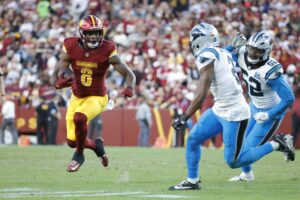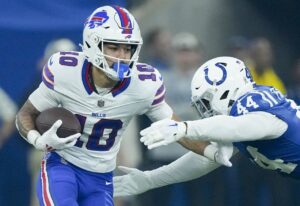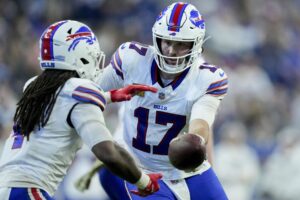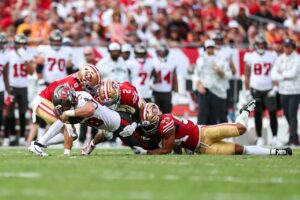It didn’t take long for running back Mark Ingram‘s absence to be felt in the New Orleans Saints 48-40 loss to the Tampa Bay Buccaneers. In the first half, Alvin Kamara gained 29 yards while averaging a respectable 4.8 yards per carry, but he received little help from the other Saints running backs.
Mike Gillislee and Jonathan Williams combined for only seven yards on four carries in the first half. This forced New Orleans to lean heavily on quarterback Drew Brees early on and by halftime, he had already attempted 21 passes. To make matters worse, Gillislee fumbled in the second quarter, and Tampa Bay returned the loose ball for a touchdown. Neither Gillislee or Williams received a carry in the second half.
The Saints must find a better rushing approach this week against the Cleveland Browns, who proved to be vulnerable against the run in week one. Ingram’s suspension runs through week four, and New Orleans cannot survive on a one-dimensional approach until he returns.
New Orleans Saints Run Game Needs to Show Up Against Cleveland Browns
Minimizing the Defense’s Exposure
Last season, the Saints defense emerged as a more dependable unit than it had been in years past. However, after an abysmal performance against Tampa Bay in which the defense allowed 529 yards, it appears the Saints have to hang their hopes on the offense for now.
New Orleans abandoned the run almost entirely in the second half, despite being down just seven points at halftime. Kamara received only two carries in the final 30 minutes with one resulting in a one-yard touchdown. Meanwhile, Tampa Bay kept a balanced approach and controlled the clock while scoring 17 unanswered points. The Saints defense grew visibly tired late in the third quarter as they gave up long touchdown plays on two consecutive drives.
As the defense attempts to find its footing again, the offense needs to establish the run early and minimize Cleveland’s time of possession. Last week, the Browns allowed Pittsburgh Steelers backup running back James Conner to accumulate 135 yards and two touchdowns last week. This signals that New Orleans should be able to establish a ground game against Cleveland despite Ingram’s absence.
Creating a Survival Plan Until Ingram’s Return
Unfortunately, there’s no obvious way to jumpstart the Saints run game right now. Kamara earned second-team All-Pro honors with his incredible play last season, and he gained an impressive 141 yards from scrimmage last week. However, head coach Sean Payton seems determined not to over-work Kamara in Ingram’s absence.
Gillislee was clearly the Saints favorite to spell Kamara, but his early fumble may have changed everything. Payton is known to discipline running backs after costly fumbles. Even Ingram saw his playing time temporarily decrease in each of the last two seasons due to late-game fumbles. Payton made these decisions despite the fact that Ingram was in the midst of his best NFL seasons, which shows how important ball control is to him.
If Gillislee has indeed found his way into Payton’s doghouse, Williams could be the next best option. Williams looked fairly dependable in the preseason, accumulating 124 yards and two touchdowns on 31 carries, although he did submit a dismal three carry, -3 yard performance in the third preseason game. Perhaps this week he’ll get a better chance to prove himself after getting just one carry last week.
Another option is rookie Boston Scott, who is currently on the Saints practice squad. Scott also showed potential in preseason action with 25 carries for 121 yards and a touchdown. However, he’s undersized at 5’6″, 203 pounds and may not be capable of the physical, downhill running New Orleans needs right now.
The Saints should activate Scott to the roster this week to at least see how he looks in regular season gameplay, even if they minimize his playing time. Since they don’t seem confident in Gillislee or Williams, New Orleans needs to figure out if Scott can make a stronger impact.
Adjusting Kamara’s Usage
If they aren’t confident in their other backs, New Orleans should consider decreasing Kamara’s snaps on pass plays and feature him more in the ground game. Since Kamara has yet to run the ball more than 12 times in an NFL game, this is an unlikely strategy for New Orleans. However, the Saints need an immediate solution for their run game, and it’s clear Kamara is their best pure runner.
The fact that Kamara is one of the Saints most dangerous receivers would make this approach difficult, especially after gaining a career-high 112 receiving yards against Tampa Bay. Kamara’s mere presence on the field on pass plays affects what defenses do. He’s also likely the best pass blocking running back on the team.
This is where Scott could come into play. We haven’t seen enough of him to know how well he can block and he only had three receptions in the preseason, but he has the athleticism to develop into a dangerous receiving back. New Orleans wouldn’t have to completely remove Kamara from their passing attack, but they could sub in Scott on a handful of pass plays. This would allow them to give Kamara more carries without over-working him.
Bottom Line
None of these options are ideal, but thanks to a great Saints offensive line, each of these backups has a chance to succeed. Whoever gets the bulk of snaps behind Kamara doesn’t need to emerge as an explosive playmaker. They just have to generate positive yardage consistently while Kamara is out of the game.
Fans may be more concerned about the defense right now, but a successful run game has benefits that transcend the number of rushing yards gained. If the Saints can jumpstart their rushing attack, it will keep their struggling defense off the field and prevent their offense from becoming one-dimensional.
This will be easier said than done with an underwhelming group behind Kamara, but the Saints coaching staff is cunning enough to find an answer for the next three weeks.






